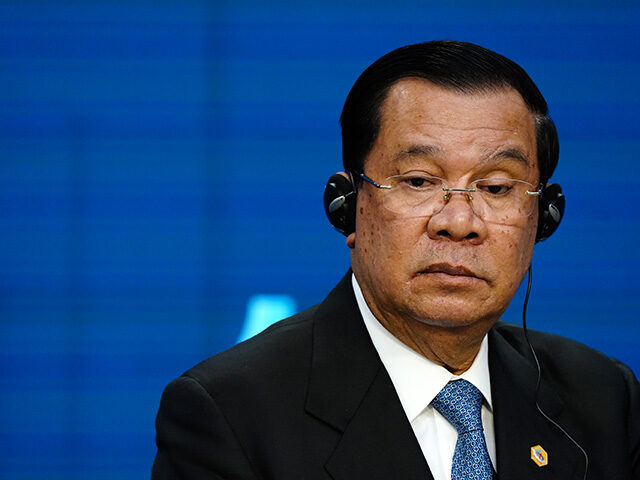Facebook, which has rebranded its parent company as Meta, on Wednesday decided not to ban former Cambodian Prime Minister Hun Sen.
Meta’s advisory board recommended suspending Hun Sen’s account for a January video post in which the former PM suggested his supporters should physically assault people who accused his communist political apparatus of vote-buying in a 2022 election.
Hun Sen, 71, was the China-friendly strongman leader of Cambodia for almost forty years. Cambodia was theoretically christened a “democracy” in the 90s, but Hun and his Cambodian People’s Party (CPP) made certain every “election” was rigged in their favor, usually by forcibly disbanding every party that ran against them. The CPP was originally an explicitly communist party but rebranded in the 1990s to nominally distance itself from socialism while retaining its totalitarian approach to government.
When Hun looked to be in trouble during his final “re-election” bid in 2018, he had the opposition party thrown out of Parliament and arrested most of its leaders. CPP went on to win every single one of the seats it forcibly vacated.
Hun Sen’s reign as maximum leader lasted from 1985 until August 22, 2023, when the National Assembly, flush with CPP loyalists after a sham election in July, anointed his successor: Hun Manet, a 45-year-old four-star general educated at West Point and New York University in the United States, who happens to be Hun Sen’s son.
Hun Sen may not be fully retired yet, as he has discussed taking a seat in the upper house of Parliament and becoming its president next year. In January, he livestreamed a fiery tirade against critics who accused CPP of stealing the last election. Hun threatened to sue these critics for making false accusations and, if that failed, he urged his supporters to beat them with sticks.
“Either you face legal action in court, or I rally [CPP] people for a demonstration and beat you up,” he said in a video that received about 600,000 views. Hun purportedly has about 14 million followers on Facebook, which is very popular in Cambodia. Skeptics suspect his follower count has been artificially inflated since the entire population of Cambodia is only about 17 million.
Facebook’s advisory board, which human rights activists have long chided for allowing Hun to spread authoritarian propaganda, decided the Cambodian strongman had finally gone too far and recommended suspending him.
“Hun Sen’s use of the platforms to incite violence against his political opposition, taken in the context of his history, his government’s human rights abuses, and the upcoming election combine to require immediate action,” the board said.
“This kind of clear incitement to cause physical harm is precisely where Meta should be drawing the line,” said Phil Robertson, deputy director of the Asia division for Human Rights Watch, when the Facebook-Meta board announced its recommendation in June.
“The real problem in the region is no institutions or organizations ever hold the likes of Hun Sen accountable for his words and actions, so it’s entirely appropriate for Facebook to make it clear they are a global platform with international standards not beholden to local dictators like Hun Sen,” Robertson said.
Robertson was not a big fan of the rigged election that secured the transfer of power to Hun Manet. He accused Hun Sen and his party of “finally and fully wiping out the remnants of Cambodian democracy in favor of hereditary dictatorship that looks like it’s right out of the North Korean playbook.”
Hun petulantly announced he would begin using Telegram and TikTok instead. Media outlets friendly to the Cambodian state made it easy to sign up for Hun’s alternate accounts by posting sign-up QR codes.
Facebook took down the video in which Hun told his supporters to pummel those who accused him of election rigging but, on Wednesday, Meta rejected the recommendation to suspend Hun’s account.
“Suspending accounts outside our regular enforcement framework would not be consistent with our policies, including our protocol on restricting accounts of public figures during civil unrest,” the organization said in a statement. Facebook notably had no problem suspending the accounts of former U.S. President Donald Trump from 2021 to early 2023.
Facebook’s oversight board was surprisingly feisty in standing behind its recommendation, urging the parent company Meta to “do everything in its power to deter public figures who exploit its platforms to incite violence.”
The Cambodian government rubbed the embarrassment in Meta’s face by “congratulating” the company for its “fair judgment,” and informing the 22 members of the oversight board that they are no longer welcome to visit Cambodia.
“This decision reflects the integrity of information broadcast on the official Facebook page of former Prime Minister Hun Sen,” the Canadian Ministry of Post and Telecommunications said.
The ministry accused the oversight board of making “bad recommendations, which were political in nature, and interfered with Cambodia’s internal affairs.”

COMMENTS
Please let us know if you're having issues with commenting.